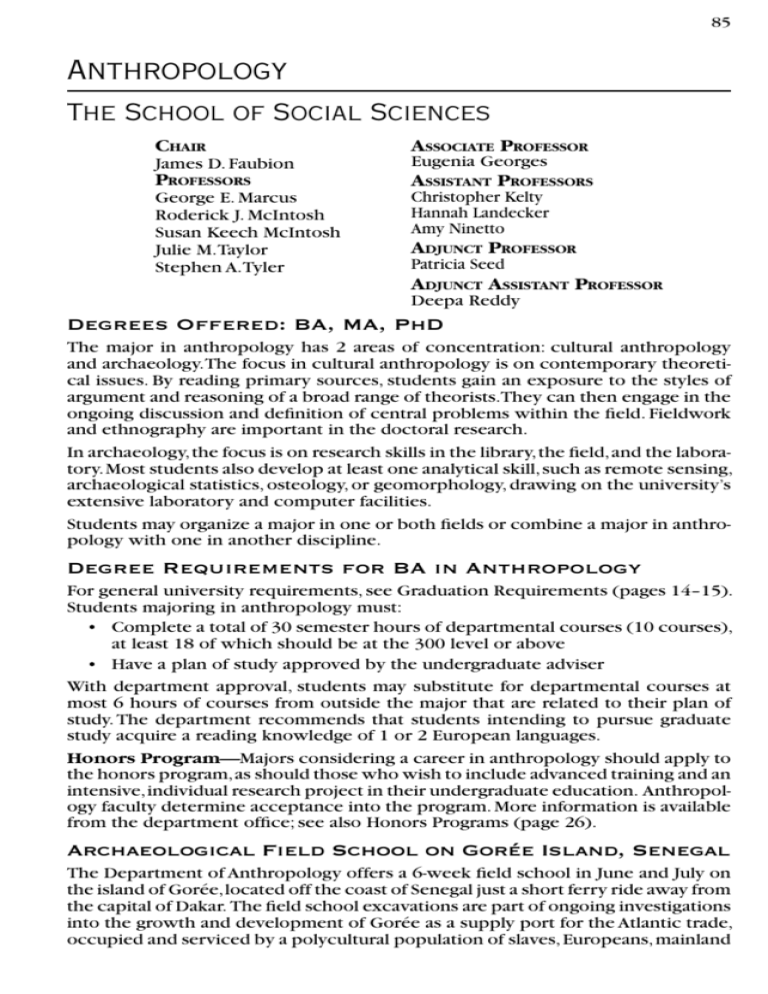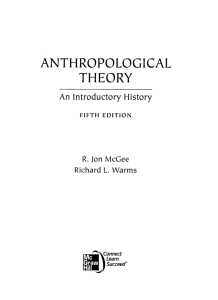Anthropology - Rice University
advertisement

85 Anthropology The School of Social Sciences CHAIR ASSOCIATE PROFESSOR PROFESSORS ASSISTANT PROFESSORS James D. Faubion George E. Marcus Roderick J. McIntosh Susan Keech McIntosh Julie M.Taylor Stephen A.Tyler Eugenia Georges Christopher Kelty Hannah Landecker Amy Ninetto ADJUNCT PROFESSOR Patricia Seed ADJUNCT ASSISTANT PROFESSOR Deepa Reddy Degrees Offered: BA, MA, PhD The major in anthropology has 2 areas of concentration: cultural anthropology and archaeology. The focus in cultural anthropology is on contemporary theoretical issues. By reading primary sources, students gain an exposure to the styles of argument and reasoning of a broad range of theorists.They can then engage in the ongoing discussion and definition of central problems within the field. Fieldwork and ethnography are important in the doctoral research. In archaeology, the focus is on research skills in the library, the field, and the laboratory. Most students also develop at least one analytical skill, such as remote sensing, archaeological statistics, osteology, or geomorphology, drawing on the university’s extensive laboratory and computer facilities. Students may organize a major in one or both fields or combine a major in anthropology with one in another discipline. Degree Requirements for BA in Anthropology For general university requirements, see Graduation Requirements (pages 14–15). Students majoring in anthropology must: • Complete a total of 30 semester hours of departmental courses (10 courses), at least 18 of which should be at the 300 level or above • Have a plan of study approved by the undergraduate adviser With department approval, students may substitute for departmental courses at most 6 hours of courses from outside the major that are related to their plan of study. The department recommends that students intending to pursue graduate study acquire a reading knowledge of 1 or 2 European languages. Honors Program—Majors considering a career in anthropology should apply to the honors program, as should those who wish to include advanced training and an intensive, individual research project in their undergraduate education. Anthropology faculty determine acceptance into the program. More information is available from the department office; see also Honors Programs (page 26). Archaeological Field School on Gorée Island, Senegal The Department of Anthropology offers a 6-week field school in June and July on the island of Gorée, located off the coast of Senegal just a short ferry ride away from the capital of Dakar. The field school excavations are part of ongoing investigations into the growth and development of Gorée as a supply port for the Atlantic trade, occupied and serviced by a polycultural population of slaves, Europeans, mainland 86 DEPARTMENTS / Anthropology Africans, and mixed-race female landowners, known as signares. Two courses, ANTH 364 and 370, are offered for a total of 6 hours credit.The courses are offered without specific prerequisites, but there is a general requirement that students have some prior coursework in archaeology or African history. Program fees apply. Degree Requirements for MA and PhD in Anthropology Because each field of specialization offers different opportunities for training and different research orientations,the department seeks applicants with a defined interest in either cultural anthropology or archaeology; an undergraduate background in anthropology is desirable but not required. Entering students devise a detailed first-year plan of study and provisional plans for succeeding years in consultation with an adviser. The plan should emphasize broad training in the selected field before the eventual definition of a project for dissertation research. For general university requirements, see Graduate Degrees (pages 57-58). MA Program—Graduate students may earn the MA after obtaining approval of their candidacy for the PhD For the MA as a terminal degree, students must complete: • 30 semester hours of approved course work • 1 of the 3 special papers required for the PhD • A thesis PhD Program—For the PhD degree, students must accomplish the following: • Complete 3 substantial papers, each emphasizing an analytical, research, and writing skill appropriate to their field of specialization (should be completed during the first two years of study) • Demonstrate reading competency in 1 foreign language • Prepare a satisfactory proposal for dissertation research, based in substantial part on field research • Complete and defend the dissertation Special Options—The department will arrange seminars and tutorials on any topic relevant to a student’s training; these seminars may be conducted in supervisory consultation with scholars in other disciplines as well as with adjunct faculty. Students interested in the specialized field of medical anthropology may take advantage of the extensive resources of the Texas Medical Center through ties established with the University of Texas School of Public Health and Graduate School of Biomedical Sciences; students may earn degree credit for formal courses taken at both schools. Financial Support—All first-year students receive the same level of support: a combination of graduate fellowships and tuition scholarships. These awards are renewed for a further two years of study. See ANTH in the Courses of Instruction section.








